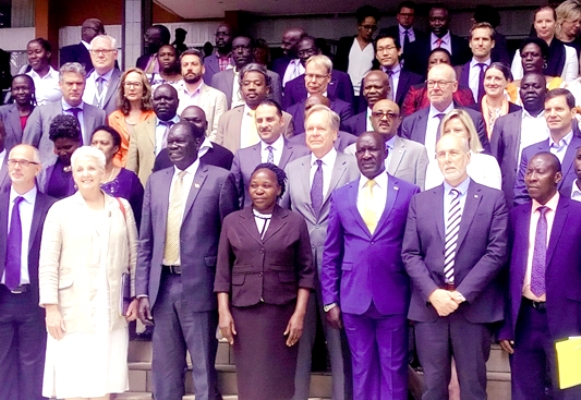Misunderstandings between Uganda government officials and development partners over the handling of refugee cash that was raised from the 2017 solidarity summit for refugees is showing signs of escalating into a major conflict that could hurt the country’s image internationally.
This is illustrated by the angry words that were expressed by the Germany Ambassador to Uganda Dr. Albrecht Conze at a breakfast meeting that was held at Kampala Serena Hotel to announce Uganda’s participation in the forthcoming Global Refugee Forum (GRF) slated to take place between December 17 -18, 2019 in Geneva, Switzerland.
At the meeting, Ambassador Conze, in an angry tone, refuted Speaker of Parliament Rebecca Kadaga’s claims that some major countries had made small pledges at the 2017 Solidarity Summit and worse still failed to deliver on their commitments.
While addressing the Pan African Parliament in August this year, Speaker Kadaga criticized the international community for failing to fulfill their pledges.
Kadaga said: “We had a solidarity summit in Uganda with all the world’s big names and leaders from the biggest economies but it was quite shocking when such leaders pledged very little sums of money and later even failed to fulfill the pledges.”
Ambassador Conze told the Tuesday breakfast meeting held at Serena that he has tried to explain to Speaker Kadaga that her perception is based on wrong information but that she has refused to change her view.
Ambassador Conze said during the breakfast meeting that: “I told the Speaker that Germany initially pledged 50m dollars and later 40m. About half of it was given, but she refused to believe it. It creates a wrong impression if someone high up in your hierarchy tells Africans that people from far away make empty promises. This is not so and I can’t do otherwise but refute the statement.”
Kadaga is not alone in criticizing development partners for allegedly betraying the courtesy of Ugandans in hosting so many refugees. With 1.17 million refugees, Uganda is currently Africa’s largest number one refugee host country and the third worldwide behind Pakistan and Turkey.
In August this year, Finance Minister Matia Kasaija during an event to sign the 2017/18 Financial and Technical Cooperation Agreements between Uganda and Germany, he also put Ambassador Conze on the spot to explain how they spent the refugee money.
“You’re telling the world that you gave us money. Tell the public which NGOs you gave money to,” Kasaija told Ambassador Conze, in undiplomatic language that felt like under-the-belt-blows.
In The Sunrise investigation published early this month, we revealed how donors said they had remitted the money they pledged through a number of UN agencies who either used the money directly to support the refugees or channeled the money through Non-Governmental Organizations.
Without revealing their intentions, the government continues to demand from the donors to reveal the identity of the NGOs and the accountability for the funds.
Officials from the Minister of Disaster Preparedness said December Forum will enable stakeholders evaluate the implementation of the commitments of the global compact on refugees.
The objective of the GRF is to encourage and mobilize other stakeholders and the international community to fund the stay of refugees in Uganda and other different countries through complete pledges.
GRF will also help enlighten the the world about the different problems that refugees go through like limited access to quality education, water and health while in foreign countries and also find a solution to these problems.
Uganda’s Minister for Relief, Disaster Preparedness and Refugees Hillary Onek insisted that more support is needed in Uganda to help facilitate refugees from different countries.
“No one chooses to become a refugee, I ask that in the spirit that we welcome our brothers and sisters, we understand how to treat them in a responsible manner,” he added: “Securing space for refugees is a shared responsibility because more refugees are still flocking to Uganda,”
Uganda pledged to continue including refugees in its national planning framework, budgets, district plans, provide land, right to walk and work, development plans and inclusion of refugees in the national statistical system except politics.
Onek said refugees have gained practical skills, have opened up businesses like garages and restaurants. He noted that refugees have helped to contribute towards the construction of 18 classrooms in Maratatu primary school which also serves the host community.
“Maratatu primary school in Chikube district Kyangwari settlement has about 7000 students and yet a class can accommodate 600 students, children speak Swahili and teachers use English, so they also need interpreters to help while in class teaching, Onek said.
However, Onek assured refugees and the rest of the world that Uganda will maintain its ‘Open Door Policy’ for refugees as a way of commitment to humanitarian and peaceful living across the globe despite the Ebola crisis.








